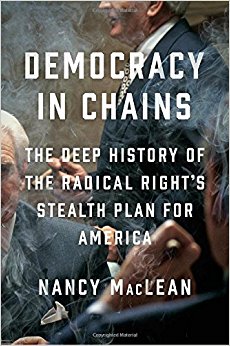
Untold Story: This is where the Koch brothers and the plan to destroy American government began.
(Editor’s Note: I am reading this book and cannot recommend it highly enough. It is far more readable than the topic might suggest and ESSENTIAL information to understand the true extent of the threat from the Trump republican party. – Mark L. Taylor)
By George Monbiot
The Guardian (7/19/17)
It’s the missing chapter: a key to understanding the politics of the past half century. To read Nancy MacLean’s new book, Democracy in Chains: The Deep History of the Radical Right’s Stealth Plan for America, is to see what was previously invisible.
The history professor’s work on the subject began by accident. In 2013 she stumbled across a deserted clapboard house on the campus of George Mason University in Virginia. It was stuffed with the unsorted archives of a man who had died that year whose name is probably unfamiliar to you: James McGill Buchanan. She says the first thing she picked up was a stack of confidential letters concerning millions of dollars transferred to the university by the billionaire Charles Koch.
Her discoveries in that house of horrors reveal how Buchanan, in collaboration with business tycoons and the institutes they founded, developed a hidden programme for suppressing democracy on behalf of the very rich. The programme is now reshaping politics, and not just in the US.
Buchanan was strongly influenced by both the neoliberalism of Friedrich Hayek and Ludwig von Mises, and the property supremacism of John C Calhoun, who argued in the first half of the 19th century that freedom consists of the absolute right to use your property (including your slaves) however you may wish; any institution that impinges on this right is an agent of oppression, exploiting men of property on behalf of the undeserving masses.
Charles Koch, currently the seventh richest man in the US, decided that Buchanan held the key to the transformation he sought. Koch saw even such ideologues as Milton Friedman and Alan Greenspan as “sellouts”, as they sought to improve the efficiency of government rather than destroy it altogether. But Buchanan took it all the way.
James Buchanan brought these influences together to create what he called public choice theory. He argued that a society could not be considered free unless every citizen has the right to veto its decisions. What he meant by this was that no one should be taxed against their will. But the rich were being exploited by people who use their votes to demand money that others have earned, through involuntary taxes to support public spending and welfare. Allowing workers to form trade unions and imposing graduated income taxes were forms of “differential or discriminatory legislation” against the owners of capital.
Any clash between “freedom” (allowing the rich to do as they wish) and democracy should be resolved in favour of freedom. In his book The Limits of Liberty, he noted that “despotism may be the only organisational alternative to the political structure that we observe.” Despotism in defence of freedom.
His prescription was a “constitutional revolution”: creating irrevocable restraints to limit democratic choice. Sponsored throughout his working life by wealthy foundations, billionaires and corporations, he developed a theoretical account of what this constitutional revolution would look like, and a strategy for implementing it.
Targeting public schools
He explained how attempts to desegregate schooling in the American south could be frustrated by setting up a network of state-sponsored private schools. It was he who first proposed privatising universities, and imposing full tuition fees on students: his original purpose was to crush student activism. He urged privatisation of social security and many other functions of the state. He sought to break the links between people and government, and demolish trust in public institutions. He aimed, in short, to save capitalism from democracy.
In 1980, he was able to put the programme into action. He was invited to Chile, where he helped the Pinochet dictatorship write a new constitution, which, partly through the clever devices Buchanan proposed, has proved impossible to reverse entirely. Amid the torture and killings, he advised the government to extend programmes of privatisation, austerity, monetary restraint, deregulation and the destruction of trade unions: a package that helped trigger economic collapse in 1982.
None of this troubled the Swedish Academy, which through his devotee at Stockholm University Assar Lindbeck in 1986 awarded James Buchanan the Nobel memorial prize for economics. It is one of several decisions that have turned this prize toxic. …
